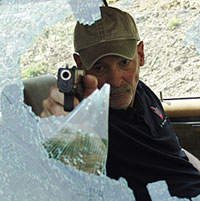Still don’t think that experience is important or that is offers an advantage? It doesn’t just apply to good guys and gals; it applies to your potential adversary as well. Below is a segment of an article written by my good friend Greg Ellifritz. Greg is a full time police officer as well as a serious trainer through both his own company (Active Response Training) as well as the Tactical Defense Institute in Southern Ohio. The article was a look at an FBI study published several years ago entitled Violent Encounters: A Study of Felonious Assaults on Our Nation’s Law Enforcement Officers.
“There is another factor that is even more important than training…its EXPERIENCE! All training is merely an artificial attempt to simulate a gunfight experience. Clearly experience matters; we try hard doing everything short of seeking out real gunfights to gain as much experience as possible in our practice sessions. In the “Violent Encounters” study, how do you think the criminals’ experience levels compared to the cops? More than 40% of the criminals identified in the study had at least one gunfight experience before attacking the officer. 25% of the attackers had been involved in more than five gunfights! That experience changes one’s perceptions of fighting with a gun. One of the interviewed criminals summed it up perfectly when he stated:
“I made up my mind that nobody was going to shoot me again.”
Take a look at this guy. He was 29 years old when he was killed by a homeowner during a home invasion. He had previously been shot in 10 other incidents and survived! Do you think that he might have picked up a few insights about gunfighting during some of those shootings?
I train cops for a living. It’s my job to talk to cops about what works and what doesn’t. I don’t currently know a single cop who has been involved in 10 on-the-job gunfights. The officers in the Violent Encounters study had far less actual experience. Less than 25% of the officers had been involved in a shooting incident before their attacks. The largest number of shootings in which any of the officers had been involved was three. On average, each officer had been involved in four incidents in which they were legally justified in shooting a criminal, but they chose not to shoot.
Both groups had different attitudes as a result of their differing levels of training and experience. The officers went out of their way to avoid gunfights. The study noted “It appeared clear that none of the officers were willing to use deadly force against an opponent if other options were available.” Contrast that with the attitude of their attackers. The report noted “Offenders typically displayed no moral or ethical restraints in using firearms…In fact the street combat veterans survived by developing a shoot- first mentality!” This study showed that the police officers were outmatched by their criminal opponents in every domain studied…training, experience, and mindset. If trained police officers are outmatched, where does that put the average citizen? It is actually quite astounding that citizens do as well as they do when they confront violent criminals!”
It is quite possible your attacker will not only be more committed to the task, but has more training and experience than you. Also keep in mind, as Greg has said, criminals have no reservation about killing; have probably already decided to do so! I once interviewed a “gunfighter felon” who had taken an interest in the training cops and armed citizens receive. He told me he once watched an instructor on “gun TV” talk about moving back and forth while reloading which he thought was amusing. A moving target is harder to hit so I asked him why he thought it was funny. “Because if you move like that a guy like me will just shoot more bullets your way…I’ll hit something!” Spray and pray, you say? Maybe…but one thing I or instructors who have faced adversity can tell you, there is a big difference between someone who launches a bunch of bullets in hopes of hitting something versus someone who launches a bunch of bullets and doesn’t care what they hit. Keep in mind your most recent Force on Force training session, during which you established your doctrine, was staffed by law abiding role players who had the same type of training as you, not a desperate criminal that will do whatever it takes to complete their crime and get away.
In the end I doubt if I have changed anyone’s mind about whether or not conflict experience makes for a “better” instructor, but maybe I have given potential students who are shopping for such instruction something to think about. It seems critical thought is lacking in this day and age, but more so in the arena of combative skills where many people are trying to corral your hard earned dollar. If there was ever a time to think hard about how to proceed, it’s when you are deciding how to go about securing your well- being or the well-being of those you love considering your potential opponent and their state of mind. Does having real world experience make for a “better” instructor? Your choice, but what I can definitely say is it sure doesn’t hurt and to those who continue to maintain experience just isn’t important…well, that just bull shit…
About the author:
 Dave Spaulding is the 2010 Law Officer Trainer of the Year and Law Officer’s Firearms columnist. A 36-year law enforcement and private security veteran, he retired at the rank of lieutenant. He is the founder of Handgun Combatives a training institution that focuses on the combative application of the handgun. He has worked in corrections, communications, patrol, evidence collection, investigations, undercover operations, training and SWAT—and has authored more than 1,000 articles for various firearms and law enforcement periodicals. He is also a graduate of most of the nation’s best known shooting schools. He’s also the author of the best-selling books Defensive Living and Handgun Combatives. Visit his web site at www.handguncombatives.com and like him on Facebook. His DVDs “Handgun Combatives are also available on Paladin Press. His latest DVDS “Situational Combative Pistols” and “Comabitive Pistolcraft Essentials” are available on Panteao Productions.
Dave Spaulding is the 2010 Law Officer Trainer of the Year and Law Officer’s Firearms columnist. A 36-year law enforcement and private security veteran, he retired at the rank of lieutenant. He is the founder of Handgun Combatives a training institution that focuses on the combative application of the handgun. He has worked in corrections, communications, patrol, evidence collection, investigations, undercover operations, training and SWAT—and has authored more than 1,000 articles for various firearms and law enforcement periodicals. He is also a graduate of most of the nation’s best known shooting schools. He’s also the author of the best-selling books Defensive Living and Handgun Combatives. Visit his web site at www.handguncombatives.com and like him on Facebook. His DVDs “Handgun Combatives are also available on Paladin Press. His latest DVDS “Situational Combative Pistols” and “Comabitive Pistolcraft Essentials” are available on Panteao Productions.




Dave- We are products of the same generation and worked the street at a time where acceptable standards for everything were different. I have a degree of understanding and experience that places me at the upper end of your curve. It is not something I am proud of. It simply is what it is and I hope all of those days are behind me.
I could not agree with you more. If I could only add one more thought to your well written article, it would be about the other aspect found in every encounter. Accountability.
This accounts for the differences between a law abiding officer (or citizen)showing a reluctance to fight.
Your point about the amount of experience
(previous shootings) recorded in the study by the felons is a call to review your mindset for training and life.
For other industry ‘so called professionals’ to trash talk your point of view is something you don’t need to defend. Hopefully your readers and students (particularly those who serve) will take this lesson to heart.
Nice work.
Just a quick note. Thanks so much Dave for ALL articles. Thanks. – Hock
While experience has its place in instruction, that assumes that the ‘experience’ was worthwhile to impart to others. In other words, did the person survive and thrive because they were good and did things correctly or was due to poor dumb luck? There’s a lot more of the latter out there than people like to admit.
For instance, let’s take the ‘experience’ of Officer G in this LAPD incident. Unless he’s done significant remediation, his experience is not what I plan to model my performance on.
Sorry, I am going to make you read through the whole report because I think the context of his performance in relation to the other officers involved is important.
http://www.lapdonline.org/assets/pdf/022-05%20Public%20BOPC%20Summary.pdf
Analogy ahead…
I have given birth to five children. By itself, that does not qualify me to be an obstetrician.
The obstetrician who delivered my youngest child had never been pregnant in his life, and never would. But he still made a quite comfortable living teaching people how to give birth and then helping them do it.